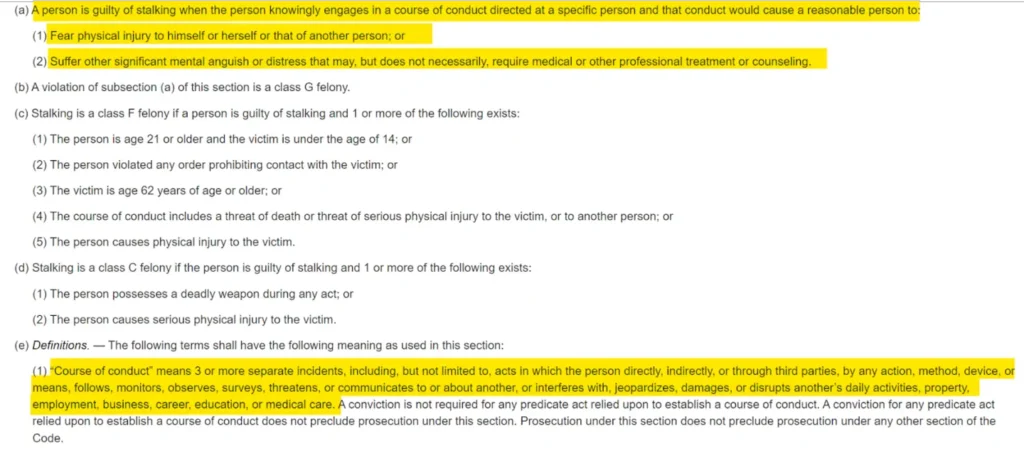Is Doxxing Illegal In Delaware?
Laura Martisiute
Reading time: 5 minutes

Table of Contents
If you live in the Diamond State and are concerned about your information being shared online, you may wonder: Is doxxing illegal in Delaware?
In this guide, we look at the state’s criminal code to see whether doxxing is illegal and what other doxxing-related activities are punishable by law.
Is Doxxing Illegal in Delaware?
No. Doxxing someone – or publishing their personal information online without their permission – is not explicitly illegal in Delaware.
Doxxing Related Activities That Are Illegal in Delaware
Even though there’s no doxxing law in Delaware, there are several doxxing-adjacent activities that are illegal in the state, including harassment, stalking, criminal mischief, identity theft, criminal trespass, and swatting.
Harassment
In Delaware, when someone issues an insult or taunt, communicates in a manner likely to cause alarm (online, in person, or otherwise), or makes repeated telephone calls to someone, it’s considered harassment under 11 DE Code § 1311 (provided there’s an intent to harass, annoy, or alarm as well).

Harassment is a Class A misdemeanor in Delaware, meaning it comes with up to one year in jail and/or a fine of up to $2,300.
Stalking
Stalking (11 DE Code § 1312) is defined in Delaware as the act of knowingly engaging in behavior that would make another person fear physical injury (for themselves or someone else) or suffer significant mental anguish.

Delaware treats stalking very seriously, with three degrees of penalties attached to the crime. It’s a Class G felony punishable by up to two years in jail and a fine of between $500-$2,000 unless the victim is a minor (and the perpetrator isn’t), a senior, has a restraining order, is threatened with death or serious injury, or is injured, in which case it’s a Class F penalty (entailing up to three years in prison and/or $500-$3,000 in fines).
In situations where a deadly weapon is involved or the victim suffers a serious injury, it’s a Class C felony penalized by up to 15 years in prison and/or a fine of between $5,000-20,000.
Criminal mischief
If someone intentionally endangers your property (such as your house or car) by doxxing you, it could be considered criminal mischief (11 DE Code § 811) in Delaware.

Criminal mischief is a Class G felony, coming with up to two years in prison and/or a fine between $500-2,000 if the loss is greater than $5,000, or a Class A misdemeanor punishable by up to one year in jail and/or a fine of $1,000 if it’s between $1,000-$5,000 in damages.
Identity theft
Doxxing can easily lead to identity theft (11 DE Code § 854), as once your personal details are available to someone, they may be able to use them to impersonate you and open financial accounts or obtain government IDs.

Identity theft is a Class D felony in Delaware, meaning perpetrators could get up to eight years in prison and/or a $2,500-$10,000 fine.
Criminal trespass
Once a bad actor finds out where you live, they could potentially get into your home.
If this happens in Delaware, it’s considered criminal trespass in the second degree (11 DE Code § 821) or third degree (11 DE Code § 822), which is a violation (third degree) or unclassified misdemeanor (second degree).

Falsely reporting an incident
One of the most dangerous activities associated with doxxing is swatting, which occurs when someone calls the police and reports a crime that isn’t actually happening with the intention of causing an emergency response by law enforcement.
In Delaware, this act is defined as “falsely reporting an incident” (11 DE Code § 1245) and comes with a Class A misdemeanor charge and an accompanying penalty of up to a year in jail and/or a $2,300 fine.

Is Doxxing Illegal at the Federal Level?
In the US, no federal law makes doxxing illegal, partly due to the vast amount of information available on the internet about any given person. However, some states (including California, Illinois, and Arizona) have or are in the process of incorporating doxxing laws into their legal codes.
Regardless of where you live, it’s important to protect your information online by shrinking your online footprint as much as possible. By doing so, you’ll minimize the chances that someone will find your personal data and get a step closer to becoming undoxxable.
How to Protect Yourself Against Doxxing In Delaware (And Elsewhere)
Before you start shrinking your online footprint, you should dox yourself.
While it may sound strange, doxxing yourself will give you an idea of where your personal details show up online and allow you to create a strategy on how to remove or hide that information.
To get started, you can follow our guide to doxxing yourself using this list of free doxxing tools.
Once you’ve found your data online, you’ll likely need to do one or more of the following to improve your online privacy:
- Opt out of data brokers. Data brokers are companies that collect personal information about people and then sell that information to anyone willing to pay their price. You can opt out of data brokers, but be aware that you’ll need to opt out of each one individually and repeatedly (as profiles reactivate whenever new data is found). Alternatively, consider subscribing to a data broker removal service such as DeleteMe.
- Change your social media privacy settings from public to private.
- Request the removal of your data from third parties, including Google’s services.
- Create and use unique usernames and passwords.
- Stop giving out/sharing personal information online.
To learn more, read our in-depth guide on how to prevent doxxing.
Our privacy advisors:
- Continuously find and remove your sensitive data online
- Stop companies from selling your data – all year long
- Have removed 35M+ records
of personal data from the web
Save 10% on any individual and
family privacy plan
with code: BLOG10
news?
Don’t have the time?
DeleteMe is our premium privacy service that removes you from more than 750 data brokers like Whitepages, Spokeo, BeenVerified, plus many more.
Save 10% on DeleteMe when you use the code BLOG10.
















